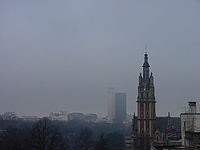
The Université Libre de Bruxelles (or ULB) is a French-speaking university in Brussels, Belgium. It has about 20,000 students.

Université Libre de Bruxelles means in English: "Free University of Brussels" or written alternatively "Non-Denominational University of Brussels", but this translation is rarely used (university names are rarely used as translated) all the more since its Dutch-speaking counterpart, the Vrije Universiteit Brussel, has the same meaning. Some facilities, shared by both universities, do use the name "Brussels Free Universities", abbreviated BFU. For example the Computing Center, BFUCC.

History
The history of the Université Libre de Bruxelles (ULB) is closely linked with that of Belgium itself. When the nine provinces that broke away from the Kingdom of the Netherlands formed the Belgian State in 1830, there were three state universities in the country: Ghent, Liege and Leuven. Even though Brussels had been promoted to the rank of capital, it still had no university.
For this reason, in 1831 a group of leading Brussels Masonic figures in the fields of the arts, science and education set themselves the objective of creating a university for the city. They had the choice between a state university and, failing that, a private institution, since the Belgian Constitution, the most liberal in Europe, allowed for this possibility.
Finding the financial burden of the three existing universities too onerous, the Belgian government showed little enthusiasm for yet another state university. However, when in 1834 the episcopate decided to found the Catholic University at Mechelen, things began to happen very quickly. The liberal professions and Freemasons, lead by Pierre-Théodore Verhaegen and Auguste Baron, who were promoting the Brussels university project, stepped up their efforts, with the result that the Free University of Belgium, as it was originally known, inaugurated its first academic year on 20 November 1834.
From 1836 it was to be called the Université Libre de Bruxelles, but although the geographical term may have changed, the adjective "free" remained. This was a key point.
The school's football (soccer) team won the bronze medal at the 1900 Summer Olympics.
Pierre-Théodore Verhaegen, who helped make the university, is the symbol of the creation of the university. November 20th, called 'St V', is a holiday for students of both the Université Libre de Belgique and the Vrije Universiteit Brussel.

Since 1935 some courses have been taught in both French and Dutch, but it was only in 1963 that all faculties held courses in both languages. Shortly after the language dispute at the Catholic University of Leuven, in October 1969 the French and Dutch entities of the ULB separated into two distinct universities. With the act of 28 May 1970, the Vrije Universiteit Brussel and the Université Libre de Bruxelles officially became two separate legal, administrative and scientific entities.
Academics
Faculties, schools and institutes
Faculty of Philosophy, and Letters
Faculty of Law, and Criminological Science
Faculty of Social and Political Sciences & Solvay Brussels School of Economics and Management
Faculty of Psychological Science, and of Education
Faculty of Sciences (recently absorbed the Institute of Environment Gestion (IGEAT))
Interfacultary School of Bio-Engineering
Faculty of Medicine
School of Public Health
High institute of Physical Education, and Kinesitherapy
Institute of Pharmacy
Faculty of Applied Sciences/Polytechnic School
Institute of Work Sciences
Institute of European Studies
Institute of Statistics and Operational Research

Université Libre de Bruxelles ranked:
154th in the 2007 THES-QS World University Ranking
183rd in the 2008 THES-QS World University Ranking
191st in the 2009 THES-QS World University Ranking
196th in the 2011 QS World University Rankings



No comments:
Post a Comment